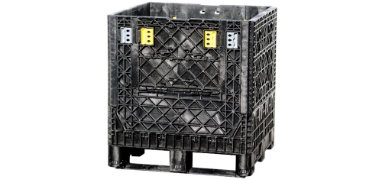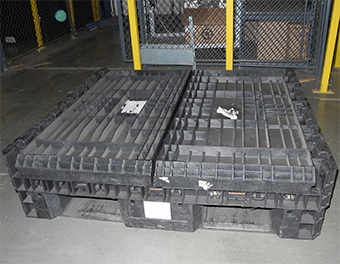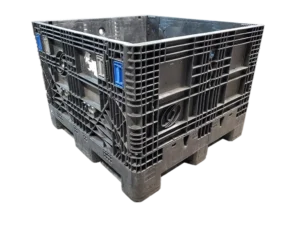Why Bulk Containers Are Important for Economical and sustainable Transport
Bulk containers play a necessary duty in modern-day logistics. They promote the effective activity of big quantities of items, therefore enhancing transport processes. This approach not only reduces prices but likewise lessens ecological effect with lower emissions and waste generation. As sectors seek even more lasting techniques, the adoption of mass containers is becoming significantly considerable. What effects does this change hold for future logistics and supply chain management?

The Advantages of Using Mass Containers in Logistics
Bulk containers revolutionize logistics by boosting efficiency and sustainability. These containers enable the transport of big amounts of items in a solitary journey, markedly minimizing the variety of journeys called for. This not only improves procedures however additionally lessens labor costs connected with handling, loading, and dumping. In enhancement, mass containers are developed to maximize space use within transport automobiles, making sure that more products can be delivered at the same time.
The standardization of mass containers additionally streamlines the logistics procedure. With consistent dimensions, they can be quickly piled and stored, bring about enhanced warehouse administration. In addition, mass containers commonly feature durable products that secure materials from damages during transportation, thereby decreasing product loss and boosting total integrity. Therefore, companies can experience improved supply chain performance, inevitably leading to increased profitability and consumer contentment. This mix of factors makes bulk containers a critical possession in contemporary logistics.
Environmental Impact: Decreasing Waste and Carbon Impact
As markets progressively prioritize sustainability, the adoption of mass containers has arised as an essential technique for minimizing waste and decreasing carbon footprints. These containers reduce using product packaging materials, such as boxes and plastic, thereby especially lowering general waste generation. By consolidating deliveries, bulk containers improve transportation efficiency, enabling more items to be transported per trip. This reduction in trips straight associates with lower greenhouse gas exhausts, adding to a smaller sized carbon impact.
Mass containers can frequently be recycled or recycled, further alleviating environmental effect. The resilience of these containers warranties they can endure numerous transport cycles, minimizing the need for single-use choices. used plastic containers. By improving logistics and advertising efficient resource usage, mass containers not only support lasting techniques yet likewise motivate sectors to line up with international environmental goals. Eventually, their implementation mirrors a dedication to ecological stewardship and accountable source monitoring
Price Savings: How Bulk Containers Lower Transportation Costs
While several business look for means to boost their lower line, the use of bulk containers provides a considerable possibility for decreasing transportation expenses. Bulk containers optimize the quantity of goods moved, allowing companies to deliver bigger quantities at once. This efficiency lowers the number of journeys required, directly decreasing fuel prices and minimizing labor expenses connected with loading and unloading.
Additionally, bulk containers usually feature structured layouts that enhance area use within transport automobiles. This indicates less empty spaces, resulting in more efficient usage of readily available capacity. In addition, the toughness of bulk containers can decrease the risk of product damage during transit, ensuring and reducing losses that even more products show up undamaged.
Enhancing Supply Chain Performance With Mass Storage Solutions
Mass storage options play a crucial function in boosting supply chain efficiency by maximizing stock monitoring. By settling goods right into fewer, larger containers, organizations can considerably decrease taking care of prices related to constant transfers and handling. This structured approach permits for better monitoring and monitoring of inventory, inevitably bring about improved operational efficiency.
Structured Inventory Monitoring
Effective supply management is vital for maximizing supply chain procedures, especially when organizations take on bulk storage remedies. These solutions make it possible for services to keep higher stock levels while reducing the frequency of replenishment. By settling products right into mass containers, firms can improve their stock processes, minimizing the complexity connected with tracking several smaller sized plans. This approach helps with precise supply matters and enhances forecasting accuracy, permitting more enlightened decision-making. Furthermore, mass storage space remedies streamline stockroom company, making it easier to locate and access items when required. As a result, organizations can attain an extra efficient supply turnover rate, inevitably enhancing overall supply chain performance and reducing the chance of stockouts or overstock circumstances.

Lowered Handling Costs
The application of mass storage space services not just improves supply management yet also significantly reduces managing prices throughout the supply chain. By consolidating materials into mass containers, firms minimize the need for constant handling and transfer between different storage and transportation units. This technique lowers labor costs associated with loading, discharging, and moving smaller bundles. Additionally, mass storage space lowers the regularity of deliveries, resulting in lower transportation expenses and lowered gas intake. Because of this, businesses can maximize their logistics procedures, enabling a more efficient appropriation of resources. Inevitably, lowered taking care of costs add to enhanced total supply chain performance, fostering an atmosphere that sustains both sustainability and economic practicality.

Adaptability of Mass Containers Across Numerous Industries
Many industries have distinctive demands for transport and storage space, mass containers have arised as a functional option that fulfills a large array of demands. These containers, ranging from huge containers to specialized containers, can suit varied materials, including granules, liquids, and powders. In the agricultural sector, bulk containers assist in the transportation of plant foods and grains, while the food and beverage sector uses them for active ingredients and finished items. The chemical industry relies upon bulk containers for securely transferring harmful materials, ensuring compliance with safety and security laws. In addition, building and construction firms profit from mass containers for delivering accumulations and other products. Their adaptability includes various modes of transport, consisting of trains, ships, and trucks, enhancing logistical efficiency. This adaptability not just simplifies procedures throughout different fields however also advertises sustainability by minimizing packaging waste and maximizing room in transportation. Bulk containers play an important function in modern supply chain administration.
Future Patterns in Mass Container Use and Sustainability
The future of bulk container usage is progressively shaped by ingenious products development that enhances sustainability. Additionally, automation in logistics promises to simplify operations, minimizing waste and boosting performance. Welcoming round economic situation practices will certainly better transform just how bulk containers are developed, made use of, and recycled, fostering an extra lasting transportation landscape.
Cutting-edge Products Growth
As sectors increasingly focus on sustainability, cutting-edge materials growth in mass containers becomes a substantial consider boosting green transportation remedies. Producers and scientists are exploring biodegradable plastics, recycled composites, and light-weight steels to lower ecological effect. These materials not just minimize waste however likewise improve fuel efficiency by decreasing the overall weight of containers. In addition, developments in wise materials, which can adjust to varying conditions, boost the resilience and functionality of bulk containers. The combination of these innovative materials straightens with round economic climate concepts, promoting reuse and recycling. As the demand for lasting practices expands, the development of such materials will certainly play a crucial duty fit the future of mass container use in logistics and transportation.
Automation in Logistics
Substantial innovations in automation are poised to transform logistics and the application of mass containers, enhancing sustainability in transportation. Automated systems, including drones and independent automobiles, are enhancing the activity of bulk containers, minimizing the dependence on standard fuel-powered transport. These innovations maximize transmitting and filling processes, reducing vacant miles and boosting fuel effectiveness. Additionally, automated supply monitoring systems boost tracking and tracking of mass containers, making sure much better source allocation and decreased waste. The assimilation of the Internet of Points (IoT) my latest blog post enables real-time data evaluation, allowing aggressive decision-making that straightens with sustainability objectives. As automation continues to advance, it is expected to drive additionally developments in bulk container usage, ultimately supporting even more lasting logistics methods and lowering the environmental effect of transportation.
Circular Economy Practices
Improvements in automation are setting the phase for read more an extra incorporated technique to circular economic climate practices in the domain name of bulk container use. As markets significantly welcome sustainability, mass containers are being developed for longevity and reusability. This shift not only decreases waste yet likewise improves resource effectiveness. Business are embracing approaches such as closed-loop systems, where made use of containers are accumulated, reconditioned, and reintroduced right into the supply chain. In addition, clever modern technologies track container life cycles, promoting much better administration and reducing ecological influence. The collaboration in between manufacturers, logistics suppliers, and end-users is essential in establishing requirements for lasting container use. used collapsible bulk containers. Future trends suggest an expanding focus on materials that are recyclable and biodegradable, additional strengthening the round economic situation's concepts in mass transportation

Regularly Asked Questions
What Materials Are Mass Containers Commonly Made From?
Bulk containers are usually constructed from sturdy products such as high-density polyethylene, cardboard, aluminum, and steel. These materials offer stamina, flexibility, and security, making them suitable for moving various goods in various industries successfully.
Exactly how Do I Choose the Right Size Mass Container?
Picking the appropriate dimension mass container entails examining the quantity of products to be carried, considering handling devices compatibility, and evaluating storage space demands. Correct size guarantees performance in transport and decreases waste throughout shipment.
Are Mass Containers Reusable or Recyclable?
Mass containers are commonly recyclable, developed for several journeys, boosting sustainability. Lots of can additionally be recycled, depending upon the materials made use of. Choosing recyclable choices further sustains environmental goals and decreases waste in transport techniques.
What Safety And Security Regulations Put On Mass Container Transport?
Safety and security laws for bulk container transportation consist of conformity with the Division of Transport standards, proper labeling of harmful materials, structural honesty assessments, and adherence to weight limitations to ensure secure handling and protect against mishaps throughout transportation.
Exactly How Can Services Transition to Using Bulk Containers Successfully?
Organizations can change to bulk containers by examining present logistics, training staff on handling, spending in ideal tools, enhancing stock administration, and collaborating with suppliers to assure compatibility and effectiveness throughout the supply chain.
As industries increasingly focus on sustainability, the adoption of bulk containers has actually emerged as a key method for minimizing waste and lowering carbon impacts. By consolidating materials into bulk containers, firms can simplify their inventory processes, reducing the complexity associated with tracking numerous smaller packages. As industries progressively focus on sustainability, cutting-edge materials growth in bulk containers arises as a considerable try this site element in enhancing green transport services. Automated systems, including drones and autonomous automobiles, are simplifying the motion of bulk containers, lowering the reliance on conventional fuel-powered transportation. Furthermore, automated supply monitoring systems enhance monitoring and tracking of bulk containers, making certain better source allowance and lowered waste.